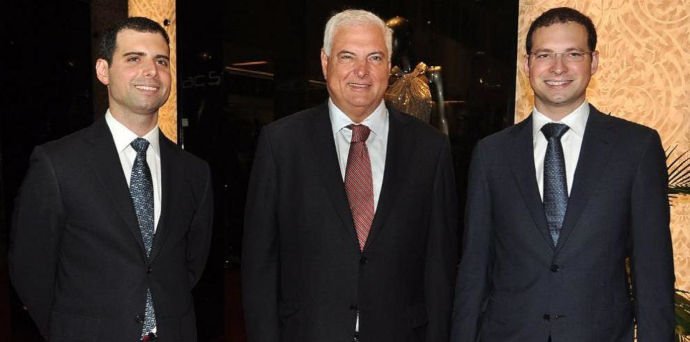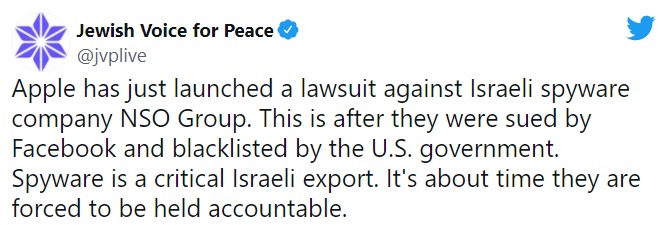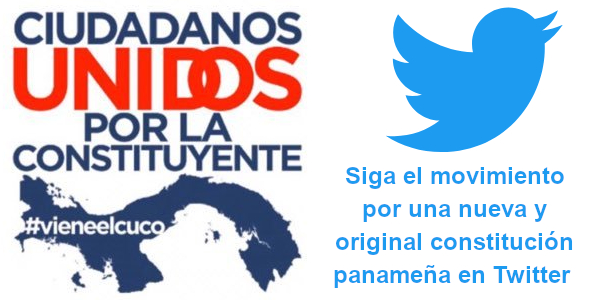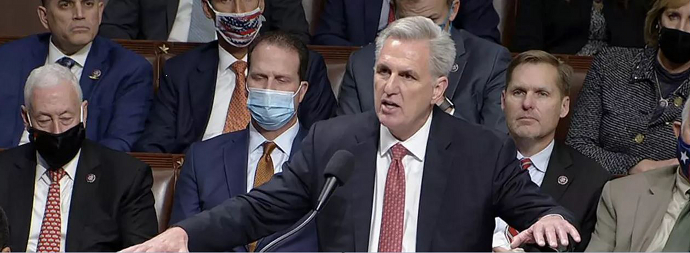The Martinellis – from the Presidencia archives, the former president Ricardo Martinelli Berrocal with his sons Ricardo Martinelli Linares on the left side of the photo and Luis Enrique Martinelli Linares on the right. Busting up family solidarity seems to be part of the US Department of Justice strategy. For one thing, both of the Martinelli Linares brothers stood to be extradited from Guatemala at the same time but Uncle Sam opted to bring Luis Enrique to face US courts in Brooklyn alone on November 15.
Luis Enrique Martinelli loses bail appeal
(of course!) yet some mysteries remain
by Eric Jackson
Who is this guy who flees the country, fights extradition and once returned, asks for bail? A Martinelli, of course, but that counts for precious little in the US courts. Luis Enrique Martinelli Linares remains in detention at the Metropolitan Detention Center in Brooklyn?
On November 15 US marshals, with an assist from the New York City SWAT team, took custody of Luis Enrique Martinelli Linares, 39, in Guatemala and brought him via a chartered jet and a heavily guarded caravan to Brooklyn. The next day he had a bail hearing before US Magistrate Marcia M. Henry, who ordered him held without bail. Martinelli appealed, and that motion was heard by US District Judge Raymond J. Dearie on November 23.
At that hearing Martinelli’s lawyer, James G. McGovern, complained that his client was being held in isolation. In the days leading up to it there were allegations floated in social media here as to the conditions of this, both by supporters and detractors of the Martinelli family enterprise. The Metropolitan Detention Center is a federal facility for those awaiting trial or sentencing, or being held for probation violations. It was built in the early 1990s to hold 1,000 prisoners, but now holds more than 1,600. For those who get into superlatives about how bad it is, in New York City the consensus worst lockup for those who know is the grotesquely overcrowded jail at Riker’s Island. But set the comparative horrors aside and time spent at the MDC is no fun.
It was an odd request and an odd expectation, perhaps. But then, the defendant is one of those characters who can afford to blow money on frivolous legal motions with little chance of success. The difference between there and here is that the judge who can be bribed is much more common in Panama than in the USA, and that while Panama in effect has no disbarment, US lawyers may be penalized for making pleadings and motions that aren’t justified by fact or law.
However, as bad as it was that a defendant with resources to flee again who had run from US justice was asking for bail, Martinelli Linares’s lawyer did have a few things to say for his client. First, there was the assertion that ICE had been pressing to arrest and deport the ex-president’s son from the United States and one standard way to avoid all that is to voluntarily leave the country. The second was the attorney’s confirmation of what had long been rumored, that the son was singing about the father’s racketeering.
Said counsel for the defense: “There has been a long relationship between US DOJ and Mr. Martinelli. Perhaps some of this should be sealed. This is a sophisticated chess game to charge Person-1, the unnamed person in the indictment.” The context of the indictment leaves no doubt that “Person-1” is former Panamanian president Ricardo Martinelli Berrocal.
Judge Dearie, however, was left unimpressed. “I’m generally in favor of bail. This case is unusual. “Mr. Martinelli’s lawyer calls it a long relationship with DOJ, but I would call it a courtship which has not yet led to any action. I’m reminded of the old bromide: Fool me one, shame on you. Fool me twice, shame on me. Being in the MDC is unfortunate. But there are boats to the Bahamas, chartered flights, false diplomatic credentials – he is a demonstrated flight risk.”
The case at hand is, according to the feds, about the laundering of some $28 million in bribes from the hoodlum Brazilian construction conglomerate Odebrecht. In a November 15 press release, the Justice Department thanked the governments of Brazil, El Salvador and Guatemala for assistance in the case. Earlier Switzerland had frozen a sum in nine figures in bank accounts attributed to the Martinelli Linares brothers and their father. Much of the tale of the Martinelli-Odebrecht connection has been aired before prosecutors and judges in Spain.
The US government hesitates to admit, let alone introduce into open court, the sorts of incriminating evidence that the American electronic spying apparatus, the National Security Agency, would bring to bear. If we are to believe revelations made year ago by former NSA contractor Edward Snowden and other fact that have come out over the years, it would be reasonable to estimate that the US government would be in possession of all the data from all electronic banking transfers by the Martinellis, and very likely the internal banking records from when any cash transfer by a courier was registered in the bank’s database. What Uncle Sam wants is testimony that can be used in open court, albeit that some lawyer might challenge it as “fruit of the poisoned tree” evidence indirectly procured by way of unwarranted electronic surveillance.
Odebrecht bribes were not just a Martinelli administration phenomenon, but also went on in the Varela administration and probably also in the PRD administration of Martín Torrijos. Prosecutors in Panama won’t look at Torrijos era stuff because that administration left office in 2009, so that statutes of limitations have run for anything that happened in its term, bar exceptional crimes like murder. Odebrecht made its public works contracting debut in Panama during the Torrijos years, starting with an irrigation project and most famously with the first part of Panama City’s Cinta Costera. An irrigation project? For most of the Torrijos administration one Laurentino Cortizo Cohen, now the president of Panama, was the agriculture minister.
Under US law, a long running conspiracy, with characters moving in and out of it, does not end for the purpose of statutes of limitations beginning to toll until that conspiracy concludes. Defense lawyers would try to segment the timelines, but don’t put it past US authorities to try to reach back for more than a decade with respect to Odebrecht schemes. They may want information from Luis Enrique Martinelli about how those operated in his time, so as to provide analytical guides and casts of characters to prior and subsequent actions. They also may not be so interested in bringing cases about those other thing, but in having detailed blackmail material for foreign policy or other purposes.
Nor would the US interest in Luis Enrique Martinelli’s information necessarily be limited to the Odebrecht affair. An overpriced construction contracts with kickbacks “in miniature” case comes to trial here next year – the Blue Apple affair, which would nail most of the main construction companies in Panama and also Ricardo Martinelli Linares. Blue Apple would necessarily implicate the former Panamanian president and also involves a Costa Rican firm MECO, which currently has six Tico mayors and the president of that company facing Costa Rican criminal charges. Then there is the similar series of cases in which the Spanish company FCC ran graft schemes on the Panamanian people.
Nor would Martinelli scams necessarily be limited to the Panamanian government. Ricardo Martinelli Linares was acting Australian consul in Panama, also handling visa affairs for Papua New Guinea in that role. A crooked Panamanian shaking down applicants for extra payments for such things might not concern US justice, but on the other hand it might in the instance where a US citizen was subjected to that “no se puede” song and dance.
So WHAT IS the interest of the United States in these matters? Officially, in a Justice Department press release, the US Attorney for the Eastern District of New York, Breon Peace, said that: “The extradition of Luis Martinelli Linares to the Eastern District of New York is a significant first step in holding him accountable for allegedly laundering millions of dollars in bribe payments through bank accounts in New York and elsewhere. Combatting bribery and money laundering by extraditing and prosecuting corrupt foreign actors like Martinelli is a priority of the Department of Justice.”
Other than crimes committed in the USA? There are lots of reasons for speculation there.
In any case, the bottom line from Luis Enrique Martinelli Linares’s appeal of his initial bail denial? “The proposed conditions do not assure the court of this gentleman’s return. I enter a permanent order of detention for Mr. Martinelli,” Judge Dearie ordered.
But keep your ears open for some interesting tunes from the Martinelli brother that the feds think most likely to talk. As his father seeks a return to the Panamanian presidency, such songs might just prove to be a useful US foreign policy implement.
Might throwing a monkey wrench into the gears of THIS campaign be one of the US policy aims? As conspiracy theories go, that one is not so outlandish. Ricardo Martinelli campaign propaganda from his Twitter feed.
Contact us by email at fund4thepanamanews@gmail.com
To fend off hackers, organized trolls and other online vandalism, our website comments feature is switched off. Instead, come to our Facebook page to join in the discussion.
These links are interactive — click on the boxes

































